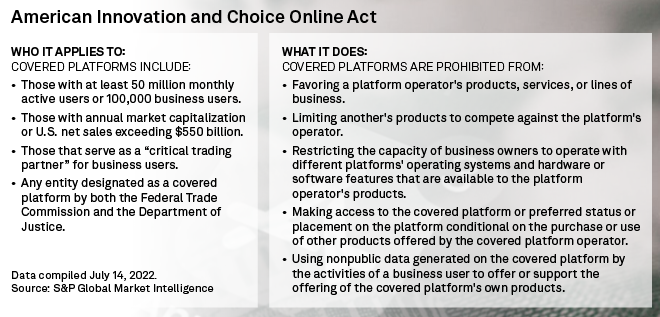|
U.S. lawmakers backing legislation that would rein in the power of Big Tech companies are pushing for a vote on a pair of tech antitrust bills in the last few weeks of this Congressional session.
The two bills are the American Innovation and Choice Online Act, or AICOA, which would prohibit large tech companies like Amazon.com Inc. from giving preferential treatment to their own products and offerings over third-party competitors; and the Open App Markets Act, which would prevent app stores run by Google LLC and Apple Inc. from requiring developers to directly use their in-app payment systems. The Open App Markets Act would also create rules regarding in-app pricing and fees for developers.
"We've got to have [Senate Majority Leader Chuck] Schumer put it up and the White House ought to be putting pressure on it," Sen. Chuck Grassley, R-Iowa, told S&P Global Market Intelligence. Grassley, who is ranking member on the Senate Judiciary Committee, co-sponsored the AICOA bill with Sen. Amy Klobuchar, D-Minn.
Asked about obstacles to getting the bill passed, Grassley said limited floor time was a major hurdle. "Klobuchar-Grassley wants this to move," the senator said, adding that he was promised a vote on the bill in July. At this point, Grassley believes getting a Senate floor vote will require White House intervention.
The White House and Schumer's office did not respond to requests for comment. Bloomberg News reported Nov. 4 that the Biden administration is advocating for tech antitrust legislation.

Party power
With Democrats retaining more Congressional seats than expected during the midterm elections, party leaders are more empowered to prioritize a vote on the bipartisan bills in the lame-duck session, said Alex Petros, policy counsel for Public Knowledge, a nonprofit consumer advocacy group in Washington, D.C. The incumbent party typically loses seats during midterm elections.
"I think this is very much an achievable, bipartisan win," Petros said.
Senate Minority Leader Mitch McConnell, R-Ky., did not answer reporters' questions while approaching the Senate chamber Dec. 1, but Petros said McConnell was officially neutral on the tech legislation, especially given his close relationship with Grassley.
"When you're looking for things to do in the lame duck, you're looking for something that is not going to take a lot of floor time and something that Mitch McConnell isn't going to fight tooth and nail over," Petros said.

Other priorities
Not everyone agrees, however, that the bills have the necessary votes or support to pass.
Some lawmakers have expressed concerns that the bills could unintentionally impact consumers' experiences on platforms. Apple CEO Tim Cook has raised security concerns over sideloading, the practice of downloading a mobile application from outside a major app store.
During the lame-duck session, Congress is focused on passing bills that would avert catastrophic consequences, such as the defense budget, said Jessica Melugin, the director of the Center for Technology and Innovation at the Competitive Enterprise Institute, a free-market think tank based in D.C.
"That's not the case at all with tech legislation," Melugin told Market Intelligence in an interview.
Furthermore, Congress does not have an agreed-upon agenda for regulating technology companies, Melugin said, noting for instance that lawmakers are split on whether to address social media content moderation or Big Tech companies' outsized market share.
"Being mad [at Big Tech] is bipartisan, but the problem is [lawmakers] are mad about different things. That doesn't lead to legislation getting passed," Melugin said.
If passed, the two tech bills' provisions would take effect after the Federal Trade Commission and Justice Department develop rules and guidance to enforce the policies outlined in the respective legislation. That would require several months of rulemaking procedures and comments from industry experts and the public.
Wall Street analysts previously told Market Intelligence the bills would ultimately have little financial impact on Big Tech companies.




